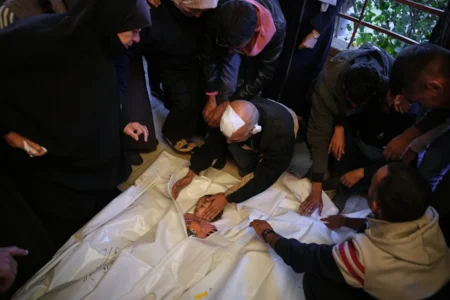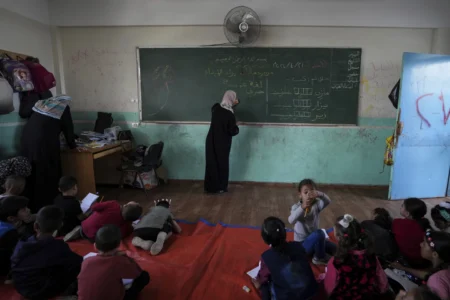Israel has blocked humanitarian aid from entering Gaza for over two months. The government says it will not allow food, fuel, water, or medicine into the area until it can stop Hamas and other groups from taking supplies meant for civilians.
But United Nations officials and major aid organizations have raised serious concerns. They warn that Israel’s latest proposal to control and distribute aid through its military could cause even more harm. They say it may force Palestinians to leave their homes, which is not allowed under international law.
Why Aid Is Blocked
Since the Hamas attacks on Israel in October 2023, the Israeli military has launched a major operation in Gaza. In response, Israel began restricting the entry of essential goods. Officials argue that without strong oversight, aid deliveries could be taken by Hamas. This would, they say, make the conflict worse and support armed groups.
However, this blockade has left more than 2 million people in Gaza in desperate need. Aid agencies report a growing risk of famine and the spread of disease due to lack of clean water and healthcare supplies.
Israeli Military Role Raises Concerns
According to sources from the UN and international NGOs, Israel has suggested using its army to control how and where aid is delivered. But many experts say this would cross a red line.
Military control over humanitarian work, they explain, could mix war aims with civilian support. It would also give the Israeli army the power to decide which areas or people receive help. This goes against the basic idea of neutrality in humanitarian work.
A senior UN official, speaking anonymously, said, “We cannot deliver aid under conditions that force people to move or that serve military goals.”
Risks of Forced Displacement
One of the biggest fears is that the aid plan would force Palestinians to move to specific areas in order to get food or medicine. This could lead to mass displacement, something that international law strongly forbids during conflict.
The Fourth Geneva Convention says that civilians should not be made to leave their homes during wartime unless it is for their safety and only temporarily. Any long-term or strategic displacement is considered a serious violation of human rights.
According to Daljoog News, international legal experts have warned that forced movements linked to aid deliveries could be classified as a war crime.
Aid Groups Say Proposal Is Unworkable
Several major humanitarian groups, including Doctors Without Borders (MSF), the International Committee of the Red Cross (ICRC), and the UN Relief and Works Agency (UNRWA), have all expressed doubts about Israel’s plan.
They argue that only neutral aid groups can fairly deliver supplies. Involving the military risks turning aid into a tool of war.
An MSF representative said, “Aid must be based on need, not on political or military goals. If we cannot deliver help where it’s needed most, people will die.”
Gaza’s Humanitarian Crisis Worsens
As the conflict continues, Gaza’s humanitarian conditions are collapsing. According to the World Health Organization (WHO), over 70% of hospitals in Gaza are no longer functioning. Thousands of children are at risk of severe malnutrition.
The UN Office for the Coordination of Humanitarian Affairs (OCHA) reported that more than 1.7 million people have been displaced since the start of the conflict. Most are living in overcrowded shelters with poor access to water and sanitation.
Fuel shortages have shut down water pumps, hospitals, and bakeries. Without electricity or medical aid, even basic survival has become difficult.
International Pressure Mounts
Many countries and human rights groups are now pressuring Israel to allow full, safe access for humanitarian aid. They call for a system that respects international law and ensures that help reaches those in need, without political interference.
The European Union, several UN agencies, and NGOs have urged for an independent aid mechanism. They want a solution that does not involve the military or force people to relocate.
Meanwhile, the United States, a key ally of Israel, has also expressed concern. U.S. officials have asked Israel to improve aid access and to follow global humanitarian rules.
What Comes Next?
There is still no final decision on how aid will be delivered in Gaza. Talks continue between Israel, the UN, and other countries. But aid groups say time is running out.
They urge all sides to focus on saving lives, not on politics. Without fast action, more people in Gaza will face hunger, illness, and even death.
As this story develops, Daljoog News will provide regular updates on humanitarian conditions in Gaza and how the global community is responding.







